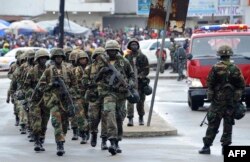The attack that killed 14 Tanzanian and five Congolese soldiers in the Democratic Republic of Congo last week highlighted the risks faced by U.N. peacekeeping missions, and the need to provide enough funding to ensure soldiers who operate in some of the world's most volatile countries remain safe.
Reform of U.N. peacekeeping missions has been a foreign policy goal for U.S. President Donald Trump’s administration, which believes the United States, the largest funder of the missions, should pay less, and the U.N. should cut costs.
There are currently 15 U.N. peacekeeping missions around the world, including eight in Africa. The United States contributes 28 percent of the U.N. peacekeeping budget. The second-biggest contributor, China, pays about 10 percent.
Nikki Haley, the U.S. ambassador to the United Nations, cheered the announcement earlier this year that the United Nations would trim its budget by $600 million, saying, “We’re just getting started.”
Vice President Mike Pence has also been critical, telling the U.N. Security Council in September that peacekeeping missions should be more efficient, credible and accountable.
Unintended consequences
Paul Williams, an associate professor at George Washington University’s Elliott School of International Affairs, said while it’s always a good idea to find ways to reduce costs, blanket cuts can make it more difficult to keep soldiers safe.
“It is going to put pressure on peacekeepers in a number of ways. It means you’re probably going to have to reconfigure your forces in some way, and that might be useful or might lead to unintended consequences,” Williams told VOA. “I think, ultimately, it becomes a little bit unfair and unrealistic to continually expect peacekeepers to do more with less money.”
The United States has a legal obligation to pay 28 percent of the peacekeeping budget, according to Williams. So, to decrease its contribution, it has pushed to reduce the overall budget, which now stands at about $7.3 billion.
To adjust to budget cuts, the United Nations must either close missions or scale back operations. Running missions with tighter budgets would mean cutting personnel or trimming logistic support. Both options concern Williams, who said U.N. peacekeepers already operate with minimal resources in remote locations that often lack sufficient infrastructure.
Shutting a mission down altogether could also reduce the budget. Since 1960, the United Nations has completed more than 20 missions across Africa. Last year, it began withdrawing troops from Liberia, a mission it plans to conclude next year.
Active missions in Africa account for about $5 billion of the total U.N. peacekeeping budget and involve nearly 91,000 personnel. The missions range in size from the $52 million, 500-person U.N. Mission for the Referendum in Western Sahara to the mission in the DRC. About $1.1 billion and some 21,000 personnel support that effort.
Strategy comes later
Aditi Gorur is director of the Protecting Civilians in Conflict Program at The Stimson Center, a nonpartisan policy research group in Washington. Like Williams, she worries that budget scale backs will adversely affect U.N. missions around the continent.
“U.N. peacekeepers play a really vital role in protecting civilians from violence, whether that’s violence perpetrated by armed groups or perpetrated by communal groups or sometimes even violence by the government itself against its own population,” Gorur said.
Some missions have already faced sizable reductions.
“A big part of the motivation for those cuts was pressure from the U.S. government,” Gorur said. What’s especially worrying, according to Gorur, is when “the cuts come first and then the strategy comes later.”
Mounting pressure
Last week’s attack in the DRC was the deadliest on U.N. peacekeeping forces in almost 25 years. More than 100 peacekeepers have died this year, according to the U.N. Department of Peacekeeping Operations. Since 1948, more than 3,700 troops have been killed.
The mission in the DRC has faced additional challenges with the country’s president, Joseph Kabila, refusing to step down, despite reaching the end of his two-term limit. Gorur said peacekeepers now have a much larger area that they need to respond to, but with fewer resources.
“There is more unrest, more violence breaking out in parts of the country that previously were relatively peaceful,” she said. “Political oppression coming from the top has manifested in growing violence, including growing local intercommunal violence, around the country.”
These conditions will likely persist amid the ongoing calls for less funding and more efficiency. “There’s some things they can do a bit better with the same budget,” Williams said. “But, if you cut budgets, it does put pressure on them in other ways.”






